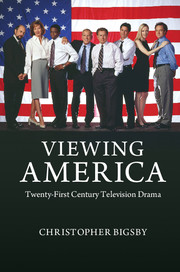Introduction
Television drama
Published online by Cambridge University Press: 05 June 2014
Summary
In the 21st century, the mass of men lead lives of quiet masturbation. Television is the optimum tool for that.
David SimonTelevision is at the base of a lot of our problems. It trivializes everything.
David ChaseI think there are some amazing highs on television and there's a permanence to it on some level…people feel less alone in a great way. It becomes part of their education. It becomes an entertainment that is substantial. They feel close to other people. They communicate with an artist. There's light shed on their lives. They're diverted. They are lifted from their burdens. They are entertained. As television turns into something else that part of it, whatever that is, that comes from the ancient plays, the ancient dramas, that's not going to go away.
Matthew WeinerTelevision, so much part of people's everyday life, has tended to be dismissed, even by its practitioners, as mere entertainment, as if entertainment were an unworthy objective. In 1884, Henry James felt obliged to defend the novel on similar grounds. How, it was said by some, could the imagined be said to bear on reality? For him, ‘The only reason for the existence of a novel is that it does attempt to represent life.’ He rejected the notion that ‘the novelist is less occupied in looking for the truth…than the historian’. The only obligation which may reasonably be expected of a novel beyond that, he suggested, was that it should be ‘interesting’. In a similar way, television drama, often not recognised by many as drama in so far as it is part of the continuum of the nightly schedule, has tended to be dismissed unless, imported from Britain and given the title Masterpiece Theatre, it is presumed to have the imprimatur of ‘culture’. Yet it can indeed seek to represent life, and in doing so enter the arena alongside the historian, the sociologist, the political scientist. Henry James, though, set the bar somewhat low in requiring the novel to be ‘interesting’, but perhaps ‘entertaining’ was too gross for his refined sensibility.
- Type
- Chapter
- Information
- Viewing AmericaTwenty-First-Century Television Drama, pp. 1 - 20Publisher: Cambridge University PressPrint publication year: 2013



